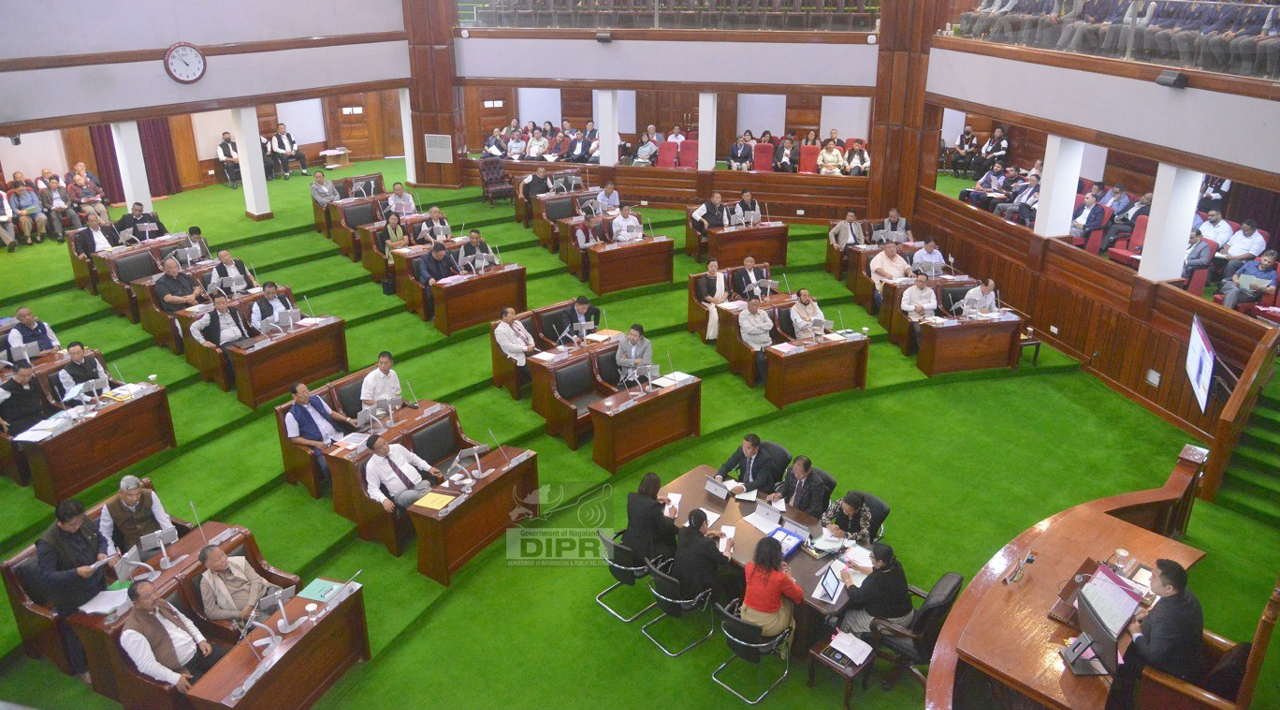NDDP MLA, A Pongshi Phom today said GST, introduced by the Government of India on July 2017 with the motto, “One Nation, One Tax”, has replaced multiple taxes and removed the cascading effect on tax-on-tax.
During a Zero Hour discussion on the topic “The Deduction of Goods and Services Tax (GST)” in the Nagaland Legislative Assembly, Phom said for Nagaland GST has become the backbone of State revenue as every individual contributes to it, whether a student buying a product or a household making purchases. Highlighting the State’s potential in food packaging industries like pickles, juices, and bio-fuels, he said such ventures would not only make Nagaland self-reliant but also generate employment and boost GST revenue through exports to other states and countries.
Stating that there has been a sharp difference between the earlier VAT collections and the present GST collections, Phom underlined that Nagaland’s GST revenue has seen a sharp rise in recent months with a remarkable 104% year-on-year growth in June 2025, following strong growth of 43% in April and 44% in May 2025. The State Tax Department attributed this surge to internal reforms, skill development, enhanced enforcement, and better compliance by the business community, he added.
The MLA suggested further revenue enhancement through awareness and compliance in key areas:
GST on Commercial Rent (18%): Very few people in Nagaland are aware that 18% of GST is applicable on commercial rent. By encouraging proper compliance, the state’s revenue can increase significantly.
GST on Sand and Stone Chips (5%): In most cases, GST invoices are not issued for sand and stone chips. Ensuring billing and compliance in this sector can boost revenue.
Unauthorized Transporters: Strict checking should be enforced on transporters who bring goods without proper documentation, as this leads to leakage of state revenue.
He also highlighted that GST was introduced in 2017, and since then, there have been no major changes in its structure. Highlighting few areas where amendments are necessary, the MLA said an unregistered person can carry out business without obtaining a GST registration.
In Nagaland, he said the current threshold is Rs. 20 lakhs for goods and Rs.10 lakhs for services. These limits were fixed in 2017 and have not been revised since. “Now, as we are in 2025 if we take near about considering an average inflation rate of 8 -10% annually,” he said, “the limit should now be almost double i.e. 40 lakhs for goods and 20 lakhs for services.”
Download Nagaland Tribune app on Google Play

He suggested that this revision is crucial to support young and first-generation entrepreneurs in our state. The Government departments are also under the purview of GST, either directly or indirectly and Departments are required to deduct 2% TDS (1% CGST & 1% SGST) on work and supply orders above Rs. 2.5 lakhs, he added.
He further said that the concerned DDOs must ensure that GSTR-7 (monthly TDS return) is filed on time, so that, suppliers and contractors do not face unnecessary difficulties. However, many departments insist on a Tax Clearance Certificate (TCC) without uploading first the 2% TDS which is not liable, because once the tax is paid and the TCC is obtained, the unreported 2% deduction effectively blocks the working capital of the firm, which can only be usable in next filing.
He urged the DDOs to ensure that TDS returns are filed promptly before demanding a TCC from contractors.
He suggested that the Government of Nagaland to form a State GST Grievance Redressal Committee comprising Government Representatives, Trade Bodies, Tax Practitioners, and Professionals.
Phom mentioned that such a committee could hold consultative meetings at least quarterly to reflect the views of the state and its people on GST, and to bring forward grievances and suggestions for improvement.
Lastly, he added that with the June GST collection figures, one can see the commendable efforts of the officers of the Taxes Department and he wished them continued success in the future.
Replying to the MLA, Chief Minister and Finance Minister, Neiphiu Rio acknowledged initial confusion in implementing GST but said things are stabilising. He informed that all major decisions on GST are taken in the GST Council chaired by the Union Finance Minister. Since he cannot attend the upcoming September 3–4 GST Council meeting, he said Minister KG Kenye would represent Nagaland and hoped that there would be some good decision in bringing some GST rates, particularly for the general public and also the consumer.
He said the state tax department had been working vigorously over the past several months to improve revenue collection and this includes lodging loopholes that cause revenue leakage, expanding market coverages raising revenue optimisation and collection affords and mass movement while revenue from the market is growing, a large portion of GST collection still comes under government work contract and it is growing in a large proportion .
Explaining, Rio said TDS ensures 2% of a contractor’s bill is deducted before payment, which must then be deposited via GSTR-7 by the 10th of the following month. Filing these returns creates an audit trail, ensuring contractors pay output tax. TCCs, meanwhile, certify that GST invoices are cleared, allowing contractors to reclaim both GST and the withheld 2%.
However, Rio admitted lapses by Departments and Drawing & Disbursing Officers (DDOs) have led to leakages. He assured corrective steps and urged stakeholders to submit specific actionable complaints rather than general allegations.
Calling for public cooperation, Rio advised citizens to demand GST bills, prefer digital payments, and report tax evasion or malpractices, even via social media. He also supported Phom’s idea of a GST Grievance Committee to bridge communication between Government, businesses, and experts.
Rio emphasised that optimising tax revenue is key to self-reliance and securing better central fund devolution. While Nagaland is exempted from property and income tax, he said businesses must comply with GST norms. “No government can survive without revenue collection,” he reminded, expressing hope that improved compliance will boost development in the State.

